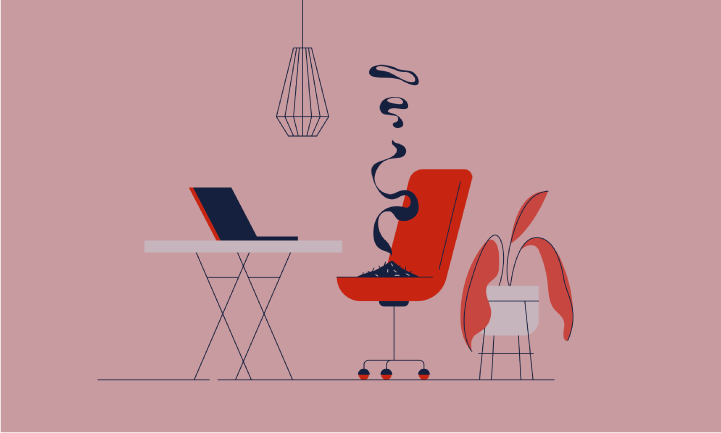Reaching Burnout: Symptoms, Causes and Prevention

If you’re feeling like everything is getting on top of you and you’re chronically exhausted, then you could be reaching burnout. The problem with burnout is it can interfere with your home life and your relationships, which could lead to loneliness and depression. In this guide, we’ll explain what burnout is, the potential causes, and how to prevent it in future.
In a rush? Read this quick summary:
- Burnout is described as a state of physical and emotional exhaustion. Someone who has burnout will have chronic stress that doesn’t seem to go away.
- Burnout can interfere with daily activities and make it difficult to keep up with demands.
- Burnout isn't necessarily a sign of depression, but it can be a factor.
- Symptoms of burnout can be physical and emotional, including feeling helpless, negative, or isolated and having muscle aches, fatigue, or trouble sleeping.
- Burnout isn't a medical condition that can be treated with medication, so treatment and recovery rely on implementing helpful changes to your daily life.
What is burnout?
Burnout is described as a state of physical and emotional exhaustion. Some people could mistake this for stress, but it’s not the same thing.
Many of us will have moments of daily stress, like when you’re stuck in traffic or you’re late for work, and this is usually resolved.
Someone who has burnout will have chronic stress that doesn’t seem to go away. It can interfere with daily activities and can make it difficult to keep up with demands. Burnout isn’t necessarily a sign of depression, but it can be a factor.
What causes burnout?
While burnout is usually associated with your job, it can also be caused by other factors. For example, if you’re a stay-at-home parent who doesn’t have the time for hobbies and engaging in self-care, then you’re at high risk of burnout. Parenting, looking after a sick relative, or even working from home can all be physically and emotionally demanding roles.
This can affect people in various ways, so while some people will cope under the pressures, others will find themselves unable to cope.
So, it seems that the main cause of burnout is taking on too many responsibilities and neglecting your own personal needs and desires. We all need to have a balance in our lives. Without that balance, you could be on your way to burnout.
What are the signs?
Burnout can affect you both physically and emotionally. The signs aren’t always obvious to some people. You might mistake the signs of burnout as general feelings of stress and boredom, but one key difference is burnout doesn’t happen overnight. Typically, the signs are there for weeks, months, or even years before you notice it impacting your daily life.
If you have any of the below symptoms, then you’re likely dealing with burnout.
Emotional symptoms
- Feeling helpless
- Feeling overwhelmed (either with work, home life or life in general)
- Feeling negative about the world
- Doubting yourself and your abilities
- Procrastinating at work
- Feeling unmotivated
- Feeling lonely and isolated from others
Physical symptoms
- Fatigue
- Headaches
- Muscle aches
- Trouble sleeping
- Changes in appetite
How to cope with burnout
If you’re experiencing burnout, the worst thing you can do is push on and try to keep it to yourself. The more you ignore the signs of exhaustion, the more exhausted you will be. You’ll reach the point where you physically can’t get out of bed anymore. Burnout isn’t a medical condition that can be treated with medication. Treatment and recovery rely completely on you.
Here are our tips on coping with burnout:
Find the right help
Help will look differently depending on who you are and what your situation is. If you’re a parent or caregiver who is struggling with the demands, then consider asking a friend or family member to help out when they can.
For example, if they could arrange to look after your child on Thursday afternoons, this would give you the time to do something for yourself. Remembering what you like to do for pleasure is important because sometimes, we all need to step back from responsibilities and relax.
Just a few hours of self-care can leave you feeling more positive and energised. Make sure you get in the habit of asking for help when you need it – don’t suffer in silence.
Rethink your work
As burnout is often linked to working situations, it’s time to think about the next steps.
If your job is making you feel overwhelmed, then talk to your manager to see what they can do to support you. Maybe a colleague could take some responsibilities off your hands. Or if you’re feeling undervalued, talk to your boss about this and the pressures you’re facing. This could be a good opportunity to ask for a raise, especially if financial concerns are making you put in too many hours of work.
In fact, working for more than 40 hours a week puts you at a much greater risk of burnout. If a 4-day working week would be better for you, consider that, too. Some workplaces are getting on board with shorter working weeks, and it might give you that work-life balance you crave.
Think about your life as a whole
Burnout isn’t often caused by one thing – it usually means that you’ve lost your way. To put it simply, you’ve lost sight of your goals and ambitions.
What could be happening is you're neglecting the things that make you happy, like your hobbies, and concentrating only on work and other responsibilities. It makes you feel tired and drained because part of you is feeling unfulfilled.
So, to combat this, you need to set aside some time to do things that you enjoy. If you like cooking, find time for it. If you want to take up a new hobby, then look up your options and fit them into your schedule.
Life is busy, and it can force you to make sacrifices. However, your happiness shouldn’t be a sacrifice.
Take some time off
If you can afford to, take some time off from work and other responsibilities and go on a holiday or a short break away.
Anyone who is feeling burnout will struggle to keep functioning unless they get a much-needed rest. Some time away to reflect is exactly what you need. Enjoy yourself, try not to think about work, and come back with a clearer mind and a plan of action.
Burnout is a sign that things need to change, so start writing a list of what needs to change in your life.



